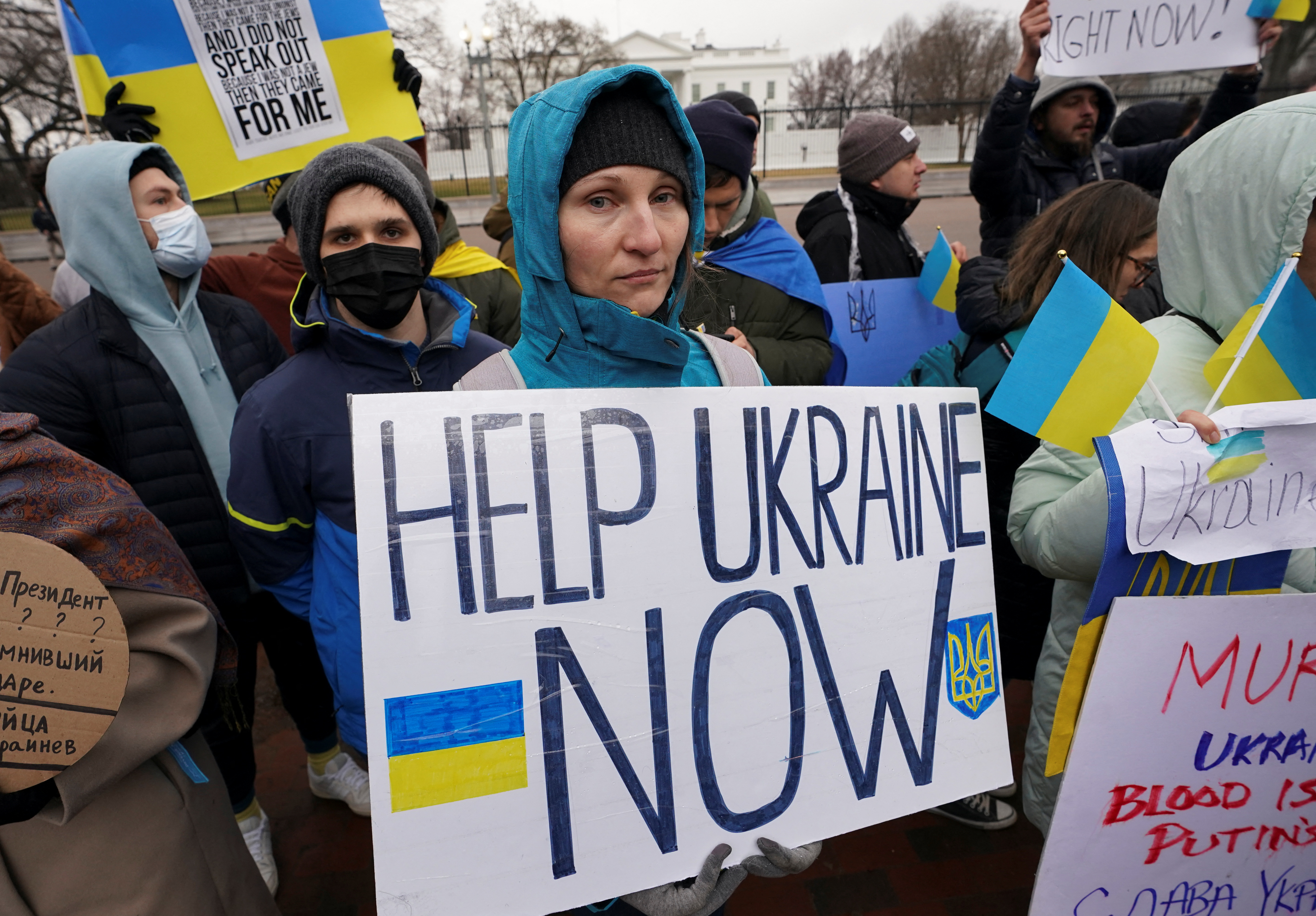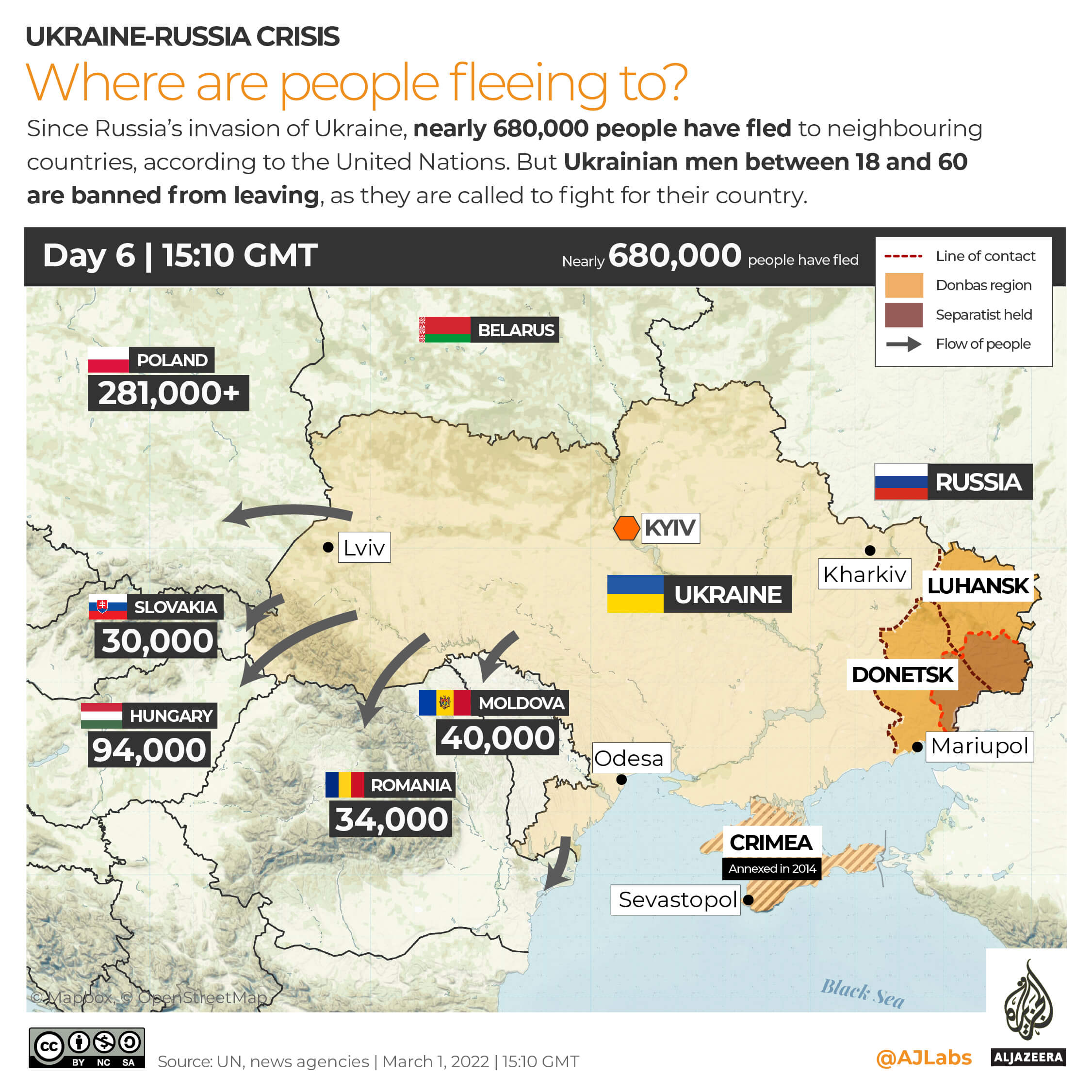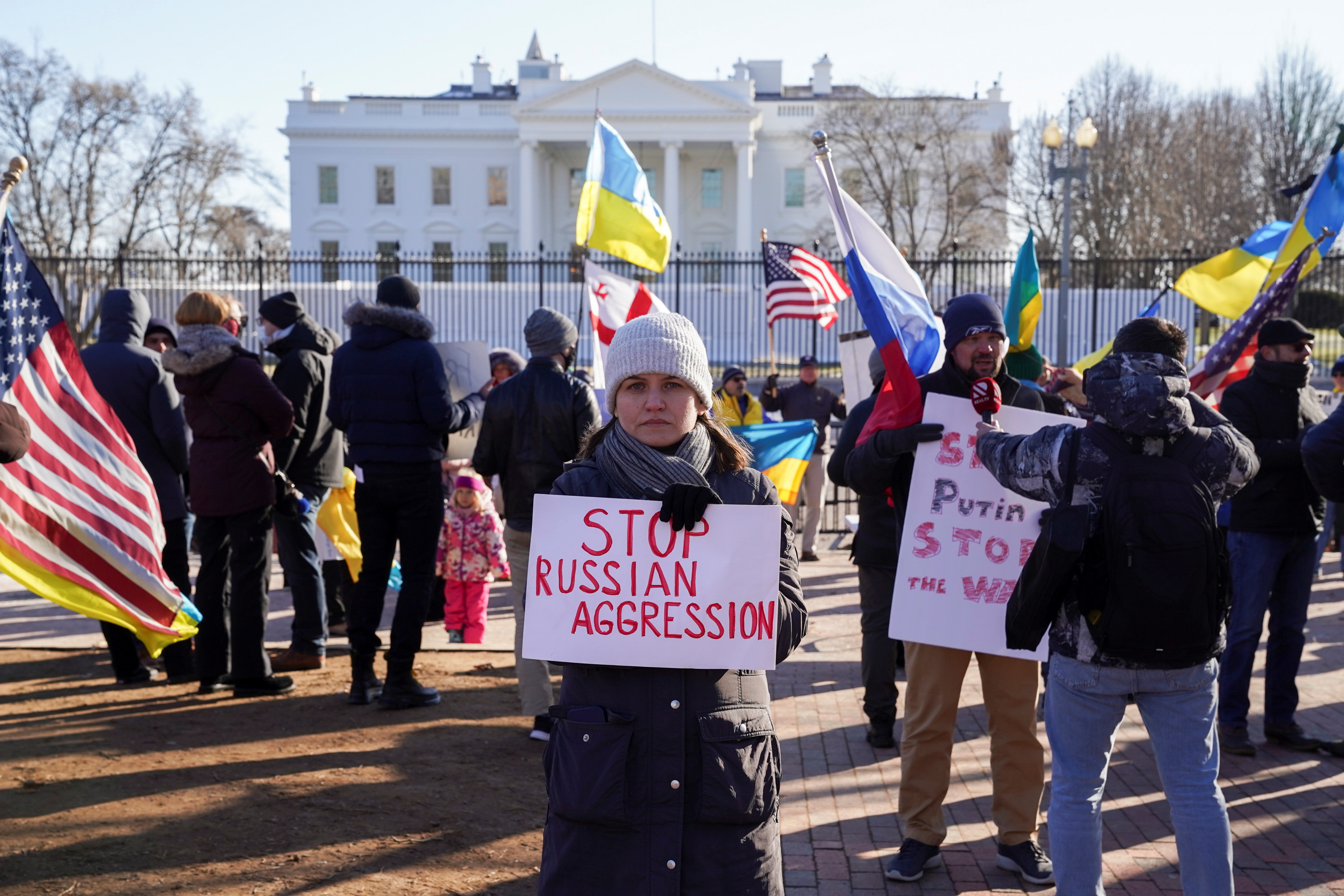
Washington, DC – Yaro Hetman says he wants the United States to do more for Ukraine, as Russia ramped up its attacks on the country’s second-largest city, Kharkiv, and advanced on the capital, Kyiv, on Tuesday.
Yetman, who moved from Ukraine to the US at the age of nine, has been leading protests in front of the White House since Russia began its invasion of Ukraine late last week. The military assault, now in its sixth day, has forced hundreds of thousands from their homes and spurred international condemnation and a slew of sanctions, including on Russia’s largest banks.
But Yetman told Al Jazeera such actions will do little to stop Russia’s advance. “They are never going to be enough to cripple the Russian war machine. This is why we call on President [Joe] Biden to keep his promise and issue crippling – and not symbolic – sanctions,” he said, calling for Moscow to be removed from the SWIFT banking system.
Yetman later told the crowd of demonstrators in the US capital, “We are thankful for all of the support so far. We need more.”

US sanctions
Alongside its European allies, the Biden administration has imposed sanctions on major Russian banks and on Russian President Vladimir Putin and Foreign Minister Sergey Lavrov over what it described as the Kremlin’s “unjustified, unprovoked, and premeditated invasion of Ukraine”.
Ukraine has urged the West to consider imposing a “no-fly zone” to stop Russia’s attacks, but the White House rebuffed that idea, saying it could lead to an unwanted, “direct conflict” between Washington and Moscow.
According to a CNN poll taken on February 25 and 26 – the first days of the Russian invasion – 83 percent of respondents said they supported increased economic sanctions against Russia, while 62 percent said they wanted Washington to do more to stop Moscow’s military operation.
Pressure is also building in Congress, explained John Herbst, the former US ambassador to Ukraine. “Both parties in Congress have been tougher on Russia … than the Biden administration,” said Herbst, now senior director of the Atlantic Council’s Eurasia Center, adding that this could be one reason the White House has now strengthened its sanctions.
“Public pressure may be part of it,” Herbst told Al Jazeera.

The imposition of major sanctions against Moscow, weapons supplied by the US and its allies to Ukraine, and NATO forces deployed to Eastern Europe have been some of the more forceful steps taken so far in response to the Russian invasion, Herbst said.
But the one action many experts agree would have the most crippling economic impact on Russia is not something the US government or the American public supports, he added: sanctions on oil and natural gas. “I don’t think we are going to see sanctions on the energy sector because the [Biden] administration is worried about the price of gas,” Herbst said.
Symbolic gestures
Still, amid widespread public anger over Russia’s invasion of its neighbour, a slew of symbolic gestures have been taken at the local and state levels across the US in solidarity with the Ukrainian people and against Russia’s advance.
Crowds have marched at rallies in New York City and other major cities; US landmarks such as the Empire State Building were lit up blue and yellow, the colours of the Ukrainian flag, and several states have banned the sale or import of Russian-made vodka.
Tom Wolf, the governor of Pennsylvania, one of the US states to ban the sale of Russian vodka, said the move was “a show of solidarity and support for the people of Ukraine and an expression of our collective revulsion with the unprovoked actions of the Russian state”.
While more than 75 million nine-litre cases of vodka were sold in the US in 2020, according to the Distilled Spirits Council of the United States, many observers have stressed that the ban is largely symbolic – and will have a limited economic effect on Moscow.
“The amount of Russian vodka in the US is less than 1 percent”, Mif Frank, who owns several wine and spirits shops in the state of Ohio, told Al Jazeera, stressing however that the ban was “the right thing to do”.
Meanwhile, a number of US states are taking or contemplating taking action against Russia in areas under their control.
Democratic New York Governor Kathy Hochul signed an executive order banning the state from doing business with Russia, for instance, while North Carolina Democratic Governor Roy Cooper ordered state offices to terminate government contracts with Russian businesses.
Cultural, sport boycotts
US sport, cultural and business entities also have ramped up actions against Russia.
The Metropolitan Opera in New York City said it would not work with performers or institutions that have voiced support for Russian President Putin, while Disney said it would pause theatrical releases in Russia. Sony Pictures Entertainment and Warner Brothers also said they would take a similar step.
FedEx and UPS said during the weekend that they would stop deliveries to Russia and Ukraine amid the fighting, and major tech companies such as Facebook have restricted access to Russian state media outlets in the European Union amid concerns over disinformation.
On Monday, the National Hockey League (NHL) said it was suspending ties to business partners in Russia over the country’s Ukraine invasion, as well as pausing its Russian language social and digital media sites. “In addition, we are discontinuing any consideration of Russia as a location for any future competitions involving the NHL,” the league said in a statement.
The US ambassador to Ukraine expressed thanks for the actions imposed so far by the international community, but asked for American businesses to take further steps.
“I know how hard it is, and I know this is business interests,” Ambassador Oksana Markarova told ABC programme This Week, “but I think it’s time to think about saving reputations and not cooperating with a regime that will end up in the Hague for everything they’ve done and they’re doing now in Ukraine.”







